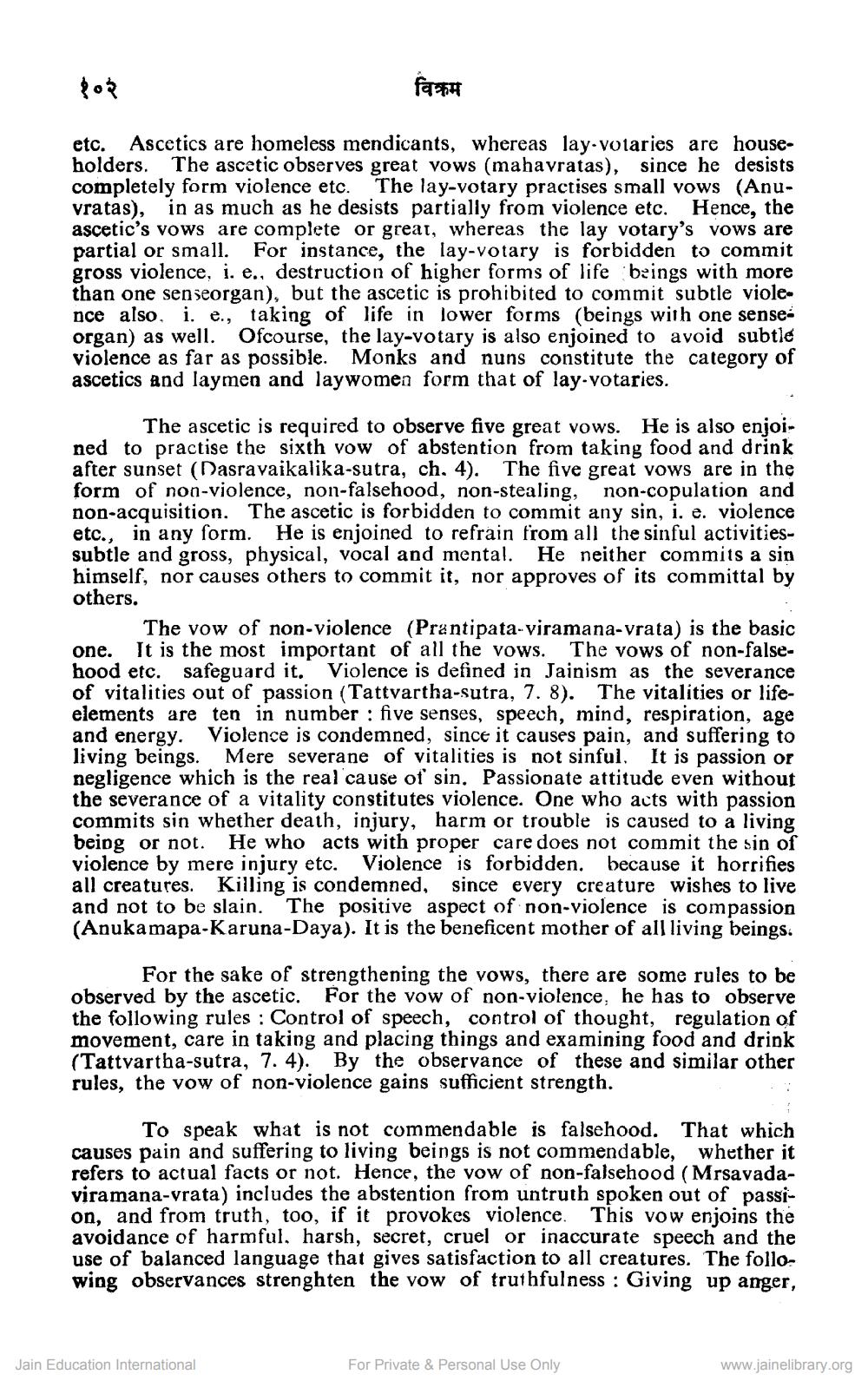________________
१०२
विक्रम
etc. Ascetics are homeless mendicants, whereas lay.votaries are householders. The ascetic observes great vows (mahavratas), since he desists completely form violence etc. The lay-votary practises small vows (Anuvratas), in as much as he desists partially from violence etc. Hence, the ascetic's vows are complete or great, whereas the lay votary's vows are partial or small. For instance, the lay-votary is forbidden to commit gross violence, i. e., destruction of higher forms of life beings with more than one senseorgan), but the ascetic is prohibited to commit subtle violence also. i. e., taking of life in lower forms (beings with one sense organ) as well. Ofcourse, the lay-votary is also enjoined to avoid subtle violence as far as possible. Monks and nuns constitute the category of ascetics and laymen and laywomen form that of lay-votaries.
The ascetic is required to observe five great vows. He is also enjoined to practise the sixth vow of abstention from taking food and drink after sunset (Dasra vaikalika-sutra, ch, 4). The five great vows are in the form of non-violence, non-falsehood, non-stealing, non-copulation and non-acquisition. The ascetic is forbidden to commit any sin, i. e. violence etc.. in any form. He is enjoined to refrain from all the sinful activitiessubtle and gross, physical, vocal and mental. He neither commits a sin himself, nor causes others to commit it, nor approves of its committal by others.
The vow of non-violence (Prantipata-viramana-vrata) is the basic one. It is the most important of all the vows. The vows of non-falsehood etc. safeguard it. Violence is defined in Jainism as the severance of vitalities out of passion (Tattvartha-sutra, 7. 8). The vitalities or lifeelements are ten in number : five senses, speech, mind, respiration, age and energy. Violence is condemned, since it causes pain, and suffering to living beings. Mere severane of vitalities is not sinful. It is passion or negligence which is the real cause of sin. Passionate attitude even without the severance of a vitality constitutes violence. One who acts with passion commits sin whether death, injury, harm or trouble is caused to a living being or not. He who acts with proper care does not commit the sin of violence by mere injury etc. Violence is forbidden. because it horrifies all creatures. Killing is condemned, since every creature wishes to live and not to be slain. The positive aspect of non-violence is compassion (Anukamapa-Karuna-Daya). It is the beneficent mother of all living beings.
commi
4Since bidden"
For the sake of strengthening the vows, there are some rules to be observed by the ascetic. For the vow of non-violence, he has to observe the following rules : Control of speech, control of thought, regulation of movement, care in taking and placing things and examining food and drink (Tattvartha-sutra, 7. 4). By the observance of these and similar other rules, the vow of non-violence gains sufficient strength.
re in takiontrol of he vow
To speak what is not commendable is falsehood. That which causes pain and suffering to living beings is not commendable, whether it refers to actual facts or not. Hence, the vow of non-falsehood (Mrsavadaviramana-vrata) includes the abstention from untruth spoken out of passion, and from truth, too, if it provokes violence. This vow enjoins the avoidance of harmful, harsh, secret, cruel or inaccurate speech and the use of balanced language that gives satisfaction to all creatures. The following observances strenghten the vow of truthfulness : Giving up anger,
Jain Education International
For Private & Personal Use Only
www.jainelibrary.org




